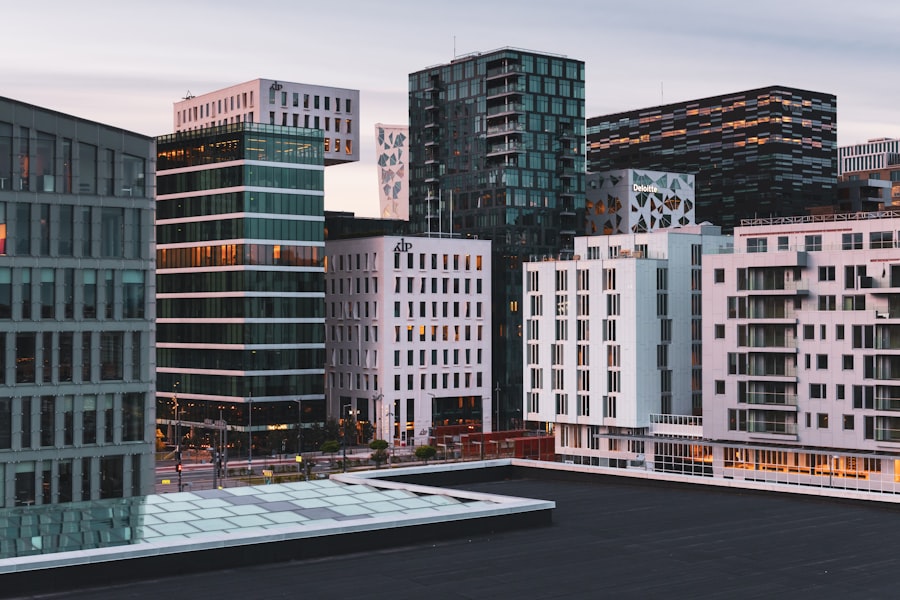Norway boasts a robust healthcare system that is primarily funded through taxation, ensuring that all residents have access to necessary medical services. The system is designed to provide comprehensive care, encompassing everything from general practitioner visits to specialised treatments. The Norwegian healthcare model is characterised by its emphasis on equality and accessibility, meaning that individuals, regardless of their financial situation, can receive the medical attention they require.
This commitment to universal healthcare is a cornerstone of Norwegian society, reflecting the nation’s values of social welfare and community support. In addition to its universal coverage, the Norwegian healthcare system is known for its high standards of care and patient safety. Hospitals and clinics are equipped with modern technology and staffed by highly trained professionals.
The system operates on a tiered basis, where patients typically begin their healthcare journey with a general practitioner (GP) who can refer them to specialists if necessary. This structure not only streamlines the process of receiving care but also ensures that patients are guided through the complexities of the healthcare landscape in Norway. Take the first step. Book a consultation with the Norway Relocation Group for your move to Norway.
Summary
- The Norwegian healthcare system is primarily funded by taxes and provides universal coverage for all residents.
- Pharmacies in Norway can be found in most towns and cities, and some are open 24/7 for emergencies.
- To obtain a prescription in Norway, you will need to visit a doctor or healthcare professional.
- Many over-the-counter medications in Norway are only available at pharmacies, not in supermarkets or convenience stores.
- Prescription refills and transfers can be easily done at any pharmacy in Norway, and some medications may require a new prescription from a Norwegian doctor.
Finding a Pharmacy in Norway
Locating a pharmacy in Norway is a straightforward task, as pharmacies are prevalent in both urban and rural areas. In cities like Oslo, pharmacies can be found in abundance, often situated near hospitals, clinics, and shopping centres. The most common pharmacy chains include Apotek 1, Vitusapotek, and Boots Apotek, each offering a wide range of pharmaceutical products and health services.
Many pharmacies also have extended opening hours, making it convenient for individuals to access medications and health advice when needed. When searching for a pharmacy, it is helpful to know that they are typically marked with a green cross symbol, making them easily identifiable. Additionally, many pharmacies in Norway offer online services where customers can check product availability and even order medications for pick-up.
This digital convenience is particularly beneficial for those who may have mobility issues or prefer to plan their visits ahead of time. Overall, finding a pharmacy in Norway is an uncomplicated process that ensures residents and visitors alike can access essential health products and services.
Obtaining a Prescription in Norway

In Norway, obtaining a prescription typically begins with a consultation with a general practitioner (GP). Patients must first schedule an appointment with their GP, who will assess their medical needs and determine whether a prescription is warranted. This process is crucial as it ensures that medications are prescribed based on individual health conditions and requirements.
The GP will then issue a prescription that can be taken to any pharmacy within Norway. It is important to note that prescriptions in Norway are usually electronic, meaning that once a GP has issued one, it is sent directly to the pharmacy of the patient’s choice. This system not only simplifies the process but also reduces the risk of errors associated with handwritten prescriptions.
Patients can easily collect their medications without needing to carry physical prescriptions, making it a more efficient experience overall.
Over-the-Counter Medications in Norway
Over-the-counter (OTC) medications are readily available in Norwegian pharmacies and are an essential part of the healthcare landscape. These medications can be purchased without a prescription and include common items such as pain relievers, cold and flu remedies, allergy medications, and digestive aids. The availability of OTC products allows individuals to manage minor health issues independently, providing immediate relief without the need for a doctor’s visit.
Pharmacists in Norway play an integral role in guiding customers towards appropriate OTC medications. They are well-trained professionals who can offer advice on which products may be most effective for specific symptoms or conditions. This level of expertise ensures that individuals can make informed decisions about their health while also receiving personalised recommendations tailored to their needs.
As such, the accessibility of OTC medications combined with pharmacist support contributes significantly to the overall health and well-being of the population.
Prescription Refills and Transfers
In Norway, managing prescription refills is a straightforward process designed to ensure continuity of care for patients requiring ongoing medication. When a patient needs to refill a prescription, they can simply return to the pharmacy where the original prescription was filled. Most pharmacies maintain electronic records of prescriptions, allowing them to quickly access patient information and dispense refills as needed.
This system streamlines the process and reduces the likelihood of errors. If a patient wishes to transfer their prescription to another pharmacy, this can also be done with relative ease. The patient must inform their new pharmacy of their intention to transfer the prescription, and the staff will handle the necessary communication with the original pharmacy.
This flexibility is particularly beneficial for individuals who may move frequently or prefer to use different pharmacies based on convenience or availability of products.
Pharmacist Services in Norway

Pharmacists in Norway are highly trained professionals who provide a wide array of services beyond simply dispensing medications. They play an essential role in patient education, offering advice on medication usage, potential side effects, and interactions with other drugs. This level of support is invaluable for patients who may have questions or concerns about their treatment plans.
Pharmacists are also equipped to conduct health screenings for conditions such as high blood pressure or diabetes, further contributing to public health initiatives. In addition to these services, many pharmacies offer specialised consultations for patients requiring chronic disease management or those seeking advice on lifestyle changes to improve their health. This proactive approach empowers individuals to take charge of their health while fostering a collaborative relationship between patients and healthcare providers.
The comprehensive services provided by pharmacists underscore their importance within the Norwegian healthcare system.
Prescription Costs and Insurance Coverage
The cost of prescriptions in Norway can vary depending on several factors, including the type of medication and whether it is covered by the national insurance scheme. Generally speaking, patients are required to pay a portion of the cost for prescription medications; however, there are caps on out-of-pocket expenses to ensure affordability. For many essential medications, especially those used for chronic conditions, costs are significantly subsidised by the government.
Norwegian residents typically have access to health insurance through the national scheme, which covers a substantial portion of medical expenses, including prescriptions. However, it is important for individuals to be aware of their specific coverage details as some medications may not be fully covered or may require prior authorisation from healthcare providers. Understanding these nuances can help patients navigate their healthcare costs more effectively.
Medication Regulations and Restrictions in Norway
Norway has stringent regulations governing the sale and distribution of medications to ensure public safety and health standards are maintained. Prescription medications are closely monitored by the Norwegian Medicines Agency (Statens legemiddelverk), which oversees drug approval processes and monitors adverse effects once medications are on the market. This regulatory framework helps protect patients from unsafe or ineffective treatments.
Additionally, certain medications may be subject to restrictions based on their potential for abuse or dependency. For instance, narcotics and psychotropic substances require special prescriptions and are closely regulated to prevent misuse. Patients must adhere strictly to these regulations when obtaining such medications, ensuring that they are used responsibly and only when medically necessary.
Online Pharmacies and Mail Order Prescriptions
The rise of digital technology has led to an increase in online pharmacies in Norway, providing an alternative option for obtaining medications. These online platforms allow patients to order prescriptions from the comfort of their homes, which can be particularly beneficial for those with mobility issues or those living in remote areas where access to physical pharmacies may be limited. However, it is crucial for patients to ensure they are using reputable online pharmacies that comply with Norwegian regulations.
Mail order prescriptions are also available for certain medications, allowing patients to receive their treatments directly at home without needing to visit a pharmacy physically. This service can be especially advantageous for individuals requiring long-term medication management or those who prefer the convenience of home delivery. Patients should consult with their healthcare providers about whether mail order options are suitable for their specific needs.
Emergency Medications and After-Hours Pharmacies
In cases of medical emergencies or urgent health needs outside regular pharmacy hours, Norway has provisions in place to ensure that individuals can access necessary medications promptly. Many larger cities have after-hours pharmacies that operate during evenings and weekends, providing essential services when most traditional pharmacies are closed. These pharmacies are equipped to handle urgent requests for medications and can assist with emergency situations.
In addition to after-hours pharmacies, individuals should be aware of emergency medication protocols in Norway. For instance, if someone requires immediate access to life-saving medications such as epinephrine for severe allergic reactions or insulin for diabetes management, they should always carry these medications with them and know how to use them properly. Being prepared can make all the difference in critical situations.
Tips for Travellers and Expats with Prescriptions in Norway
For travellers and expatriates visiting or living in Norway who require ongoing medication management, there are several important tips to keep in mind. Firstly, it is advisable to bring an adequate supply of any necessary medications along with copies of prescriptions from your home country. This documentation can be invaluable if you need to visit a local pharmacy or seek medical assistance while abroad.
Additionally, familiarising yourself with Norwegian pharmacy practices can help ease any potential challenges you may encounter when obtaining medications. Understanding how prescriptions work in Norway—such as the need for consultations with GPs—can help you navigate the system more effectively. It may also be beneficial to learn some basic Norwegian phrases related to health and medication; this can facilitate communication with pharmacists and healthcare providers.
For those looking to learn more about the Norwegian language while navigating these healthcare processes, consider enrolling in courses at the NLS Norwegian Language School in Oslo. Their comprehensive language programmes cater specifically to expatriates and travellers seeking fluency in Norwegian while providing cultural insights that enhance your experience in Norway’s healthcare system. With dedicated instructors and tailored courses designed for various proficiency levels, NLS offers an excellent opportunity to improve your language skills while ensuring you feel confident managing your health needs during your stay in Norway.
Learn more about the Norwegian classes at the NLS Norwegian Language School in Oslo

